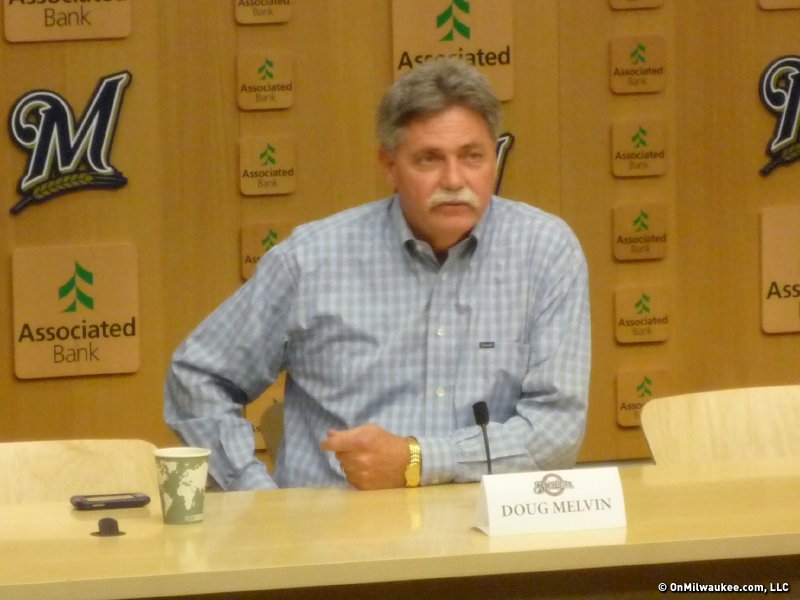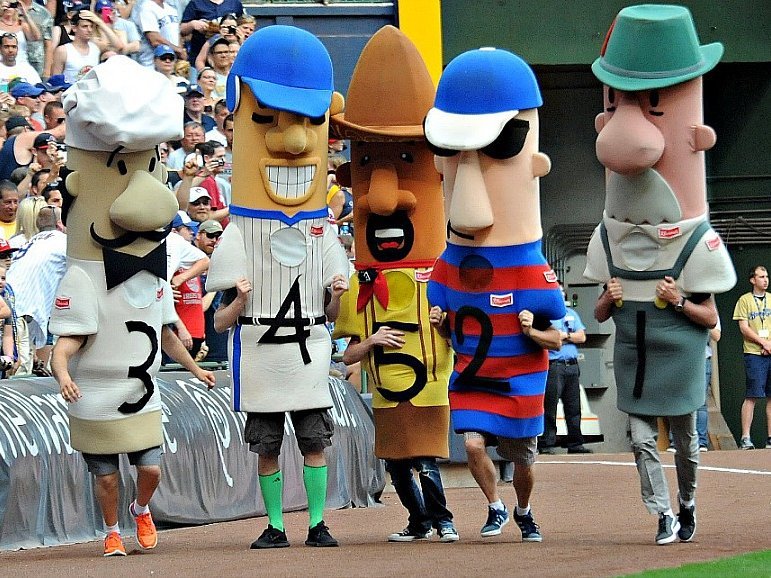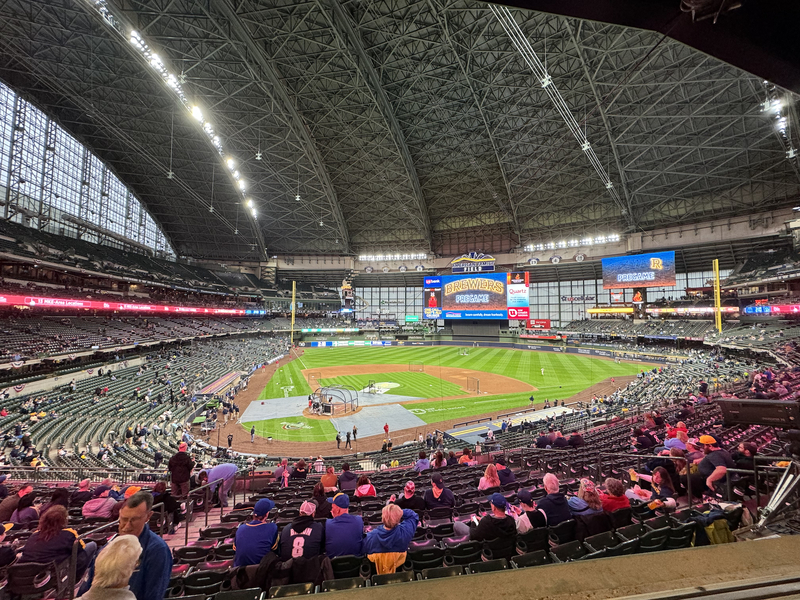Three days after his team was bounced from the National League playoffs, Brewers general manager Doug Melvin is moving on, whether he's ready to or not.
"It's a couple of days after the elimination game and you're hoping that you feel better but there's still the same feeling of being so close to being in the World Series," Melvin said. "After awhile, I try to continue to tell myself what a great year we had. We accomplished a lot. It does feel pretty good from that perspective. There were a lot of exciting moments and exciting times, and things that I'll never forget."
Melvin and his staff took the last two days off but are back and ready to get to work in building the 2012 team, which will be no easy task. Most of the Brewers' young nucleus, including MVP candidate Ryan Braun, closer John Axford and starting pitchers Yovani Gallardo and Zack Greinke are already locked into long-term contracts.
"We're creating a strategy and a game plan," Melvin said Wednesday when he met with reporters at Miller Park.
While Melvin and his staff are fortunate to bring back the entire starting rotation, and most of the starting lineup next season, the situation at third base, shortstop and the bullpen all need to be addressed.
Then of course, there's the biggest question of the next few months: What happens to first base? Prince Fielder becomes a free agent once the World Series ends and it's all but certain that his time in Milwaukee has run its course.
Thus, what can the Brewers do to fill the void?
In terms of internal candidates, Melvin all but ruled out moving Corey Hart from right field to first base. Hart was originally drafted as an infielder, Hart played primarly at first during his early years in the Brewers' system.
With Prince Fielder in the fold, Hart moved to third and later to the outfield when a combination of defensive struggles and the addition of Ryan Braun to the system necessitated a move.
"That's not something we've talked about," Melvin said when asked about shifting the former all-star. "I think in the past, he had said no to that."
One thing is certain, the Brewers won't have an excess of available payroll to make massive changes. Melvin downplayed the notion of using "Fielder money" – that is, money that would have been used to resign Fielder and is thus, otherwise available – to make a major splash on the free agent or trade markets.
Many players are due substantial raises next season due to contractual obligations or the arbitration process. The money that would go towards Fielder will likely be chewed up by those increases to players like Ryan Braun, Corey Hart, Yovani Gallardo and Rickie Weeks and arbitration-eligible players like Nyjer Morgan, Shaun Marcum and Carlos Gomez.
"We've got to look at all the other players," Melvin said. "It's not as easy as the player's salary coming off (the books), so you have that much to spend. It doesn't even come close to working that way. So many other players' salaries increase. It's not that easy as just adding and subtracting."
That could pave the way for minor league players like Mat Gamel amd Taylor Green.
Gamel was moved from first to third base this season in anticipation of Fielder's departure and has been a terror to minor league pitching but has struggled in his limited opportunities with the big club. Melvin sees similarities between Gamel and players like Texas' Nelson Cruz (himself a former Brewers prospect) and the Cardinals' David Freese, the NLCS Most Valuable Player.
"Mat Gamel has had as good a years as they did in the minor leagues," Melvin said. "He just hasn't had the chance because we haven't given him the chance. Is this the time to give Mat Gamel a chance? That's something we have to seriously consider."
What the Brewers do with Fielder could dictate their course of action at other positions, namely at third base. Casey McGehee struggled this season, a year after being named the team's most valuable player.
Melvin must decide whether McGehee's .223 average, 13 home runs and 67 RBIs in 2011 were the result of a decline, or just a one-year abberation for a player who hit .291 with 39 homers and 170 RBIs in the previous two seasons.
"I think he's probably somewhere in-between what he was this year and where he was last year," Melvin said. "Can he get back to being somewhere in between? I think he can still be a good player. He can play first and third. He'll be part of our evaluation.
"In Casey McGehee, you're getting a player who won't give up. He'll try hard; he's got great heart. He loves this organization. Guys can bounce back."
The left side of the infield was a problem throughout the year as Yuniesky Betancourt struggled at the plate, as well. Part of the Zack Greinke trade, Betancourt was unpopular among fans for his approach at the plate but after hitting just .253 in the regular season, Betancourt was one of the better performers during the postseason, posting a .310 average with three doubles and six RBIs.
He has a $6 million option for next season which the Brewers can buy out for $2 million, money they received from Kansas City as part of the trade agreement. Melvin said Betancourt's future is one of the many things his staff needs to discuss, but there has been no decision made at this point.
"I thought Yuni Betancourt was a better player than what his critics said," Melvin said. "I thought he did a very good job. If you look at the on-base percentage, that's the thing that always seems to hurt him. I thought he made a lot of good plays, a lot of outstanding plays."
Melvin also acknowledged that his team needs to improve defensively. The Brewers committed 111 errors during the regular season with three players, Fielder (15), second baseman Rickie Weeks (15) and third baseman Casey McGehee (20) each led the National League in errors at their position. Yuniesky Betancourt (21) finished third among shortstops.
In the playoffs, they were charged with 12 errors – well ahead of second-place Detroit, which recorded five. In the final two games of the National League Championship Series, Milwaukee committed seven errors.
To improve defensively, however, Melvin says there may need to be a sacrifice offensively. With Fielder expected to be gone, the margin for error grows smaller.
"If you get better defensively, you're probably not going to be as good offensively," Melvin said. "If you get a quality defender that's a good offensive player, he's probably an all-star. That's the balance we have to look at."
Melvin plans to get the process started in the coming days by sitting down with manager Ron Roenicke for an evaluation of each individual player. He'll also meet with members of the coaching staff, though he wouldn't say if any or all of the coaches would return in 2012.
Teams have a five-day window for exclusive negotiations with their own free agents beginning the day after the World Series but Melvin said he expects most things to develop during the annual winter meetings, which take place in early December in Dallas.
Until then, the focus is on making 2012 as memorable as the 2011 season.
"We provided a lot of baseball for our fans and they provided great support. We still want to get to a World Series and win a World Series. Our goals haven't changed. Our mind set hasn't changed. The roster probably does change; rosters change every year."
Arbitation-eligible players: First-year – Casey McGehee, Nyjer Morgan, George Kottaras; Second-year – Kameron Loe, Manny Parra, Josh Wilson; Third-year – Shaun Marcum, Carlos Gomez.
Free agents for 2012: Craig Counsell, Prince Fielder, Jerry Hairston, Jr., LaTroy Hawkins, Mark Kotsay, Francisco Rodriguez, Takashi Saito.







